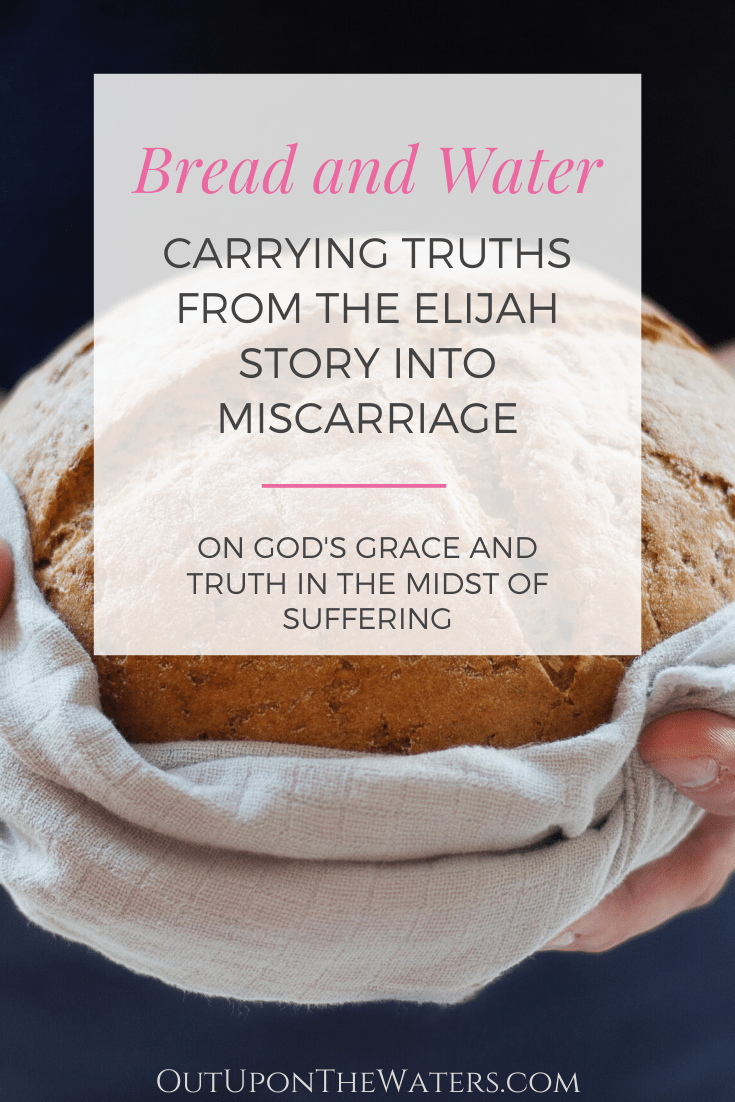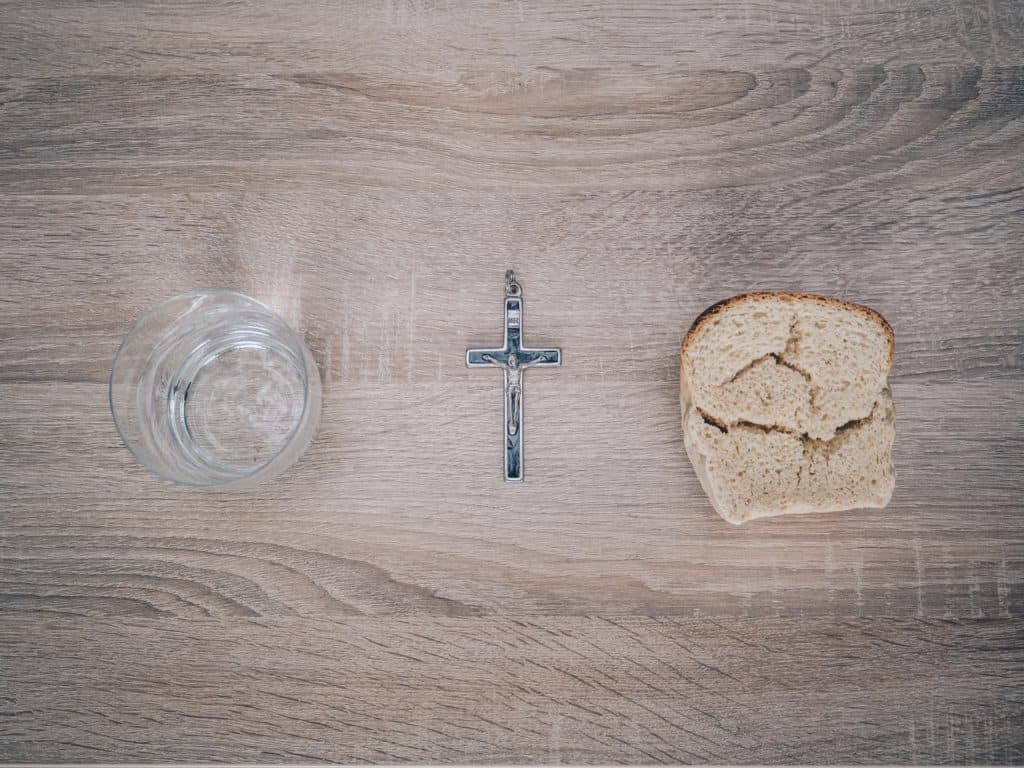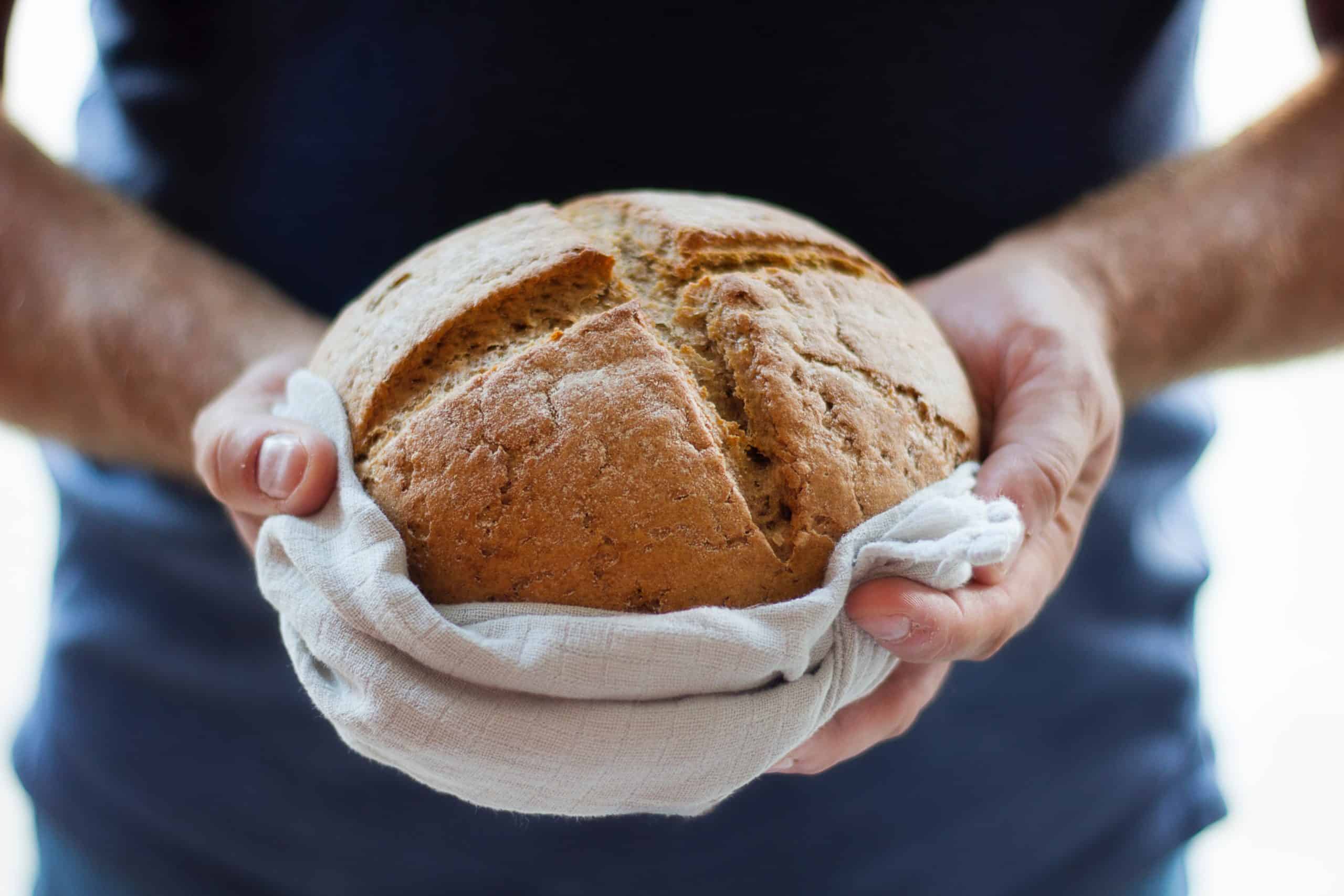On June 21, I miscarried twins.
It was a devastating experience, and one that I was completely unprepared for - we never are.
I remember lying on the couch for days on end, staring into nothing. I remember wearing a sunhat and sunglasses every time I left the house so that strangers wouldn't see me crying. I remember the first package that arrived in the mail that I had ordered before it had happened - baby lotion, bum cream, and body balm - and not being able to even open the box.
I remember skipping my morning Bible study for a good two weeks - waking up, going downstairs, and just lying in silence instead - because, in light of the depth of loss and darkness that I was experiencing, reading a random Old Testament passage, New Testament passage, and a psalm, and then what some guy had to say about them seemed pointless. What good were Bible facts? Why would I care about the life of some king who lived thousands of years ago and the lessons we could draw about serving idols?
I remember showing up at the hospital, completely defeated, and not even being able to give voice to why I was there without breaking down in tears.
And yet, in retrospect, this story is not one about tragedy and loss. It is one about patches of light in the darkness, about God's walking with me through suffering, about a tangible, living experience of the power of Gesthemane and the cross.

Bread and Water
Before I speak of (or write of) Gesthemane and the cross, however, I want to re-tell the story of Elijah. Because the story of a prophet who lived almost 3,000 years ago contains live-giving truth that we can carry with us even into miscarriage - as I discovered this summer.
In 1 Kings 17-19, we read of the prophet Elijah's ministry - a quite successful one - and his subsequent flight from God.
After a massive success, Elijah was threatened and wanted to give up. He was exhausted, afraid, discouraged, and depressed.
So was I.
I thought this was the plan, God. I was on board. You were on board. What happened?
And yet, when Elijah flees into the wilderness, there he finds God. He finds God in the form of an angel who brings him bread and water - sustenance for the journey ahead. "Get up and eat," the angel commands him, "for the journey is too much for you." (1 Kings 19:7)
No truer words were ever spoken: the journey is too much for you. And yet, God knows this. He prepares us. He sends help. He sends bread and water.
It is remarkable, in times of darkness, how many loaves of bread and jars of water we are provided with.

The Story of Elijah
The story of Elijah comes in 1 Kings 17-19, and 2 Kings 2. Elijah appears suddenly during the reign of king Ahab, predicting drought throughout the land. Elijah's ministry, while fairly short (it comprises only 3 chapters in 1 Kings, while 2 Kings tells us of Elijah being taken up to heaven) but it is also quite spectacular.
Elijah is led into the woods, after predicting the drought, by the word of God, and there he is fed by ravens. "The ravens brought him bread and meat in the morning and bread and meat in the evening, and he drank from the brook" (1 Kings 17:6).
Elijah is led into the town of Zarephath, again by the word of God, where he performs not one, but two miracles for a woman and her son on the verge of starvation.
First, despite the drought, and despite the fact that she had only a handful of flour and a little olive oil left in her house, "the jar of flour was not used up and the jug of oil dig not run dry, in keeping with the word of the Lord spoken by Elijah" (1 Kings 17:16). Second, when the woman's son later dies of an illness, Elijah raises him from the dead.
Elijah defeats the prophets of Baal (Baal was a fertility god worshipped in many ancient Middle Eastern communities) after they accept his challenge to prove - through prayer - who is the true God.
"Get two bulls for us," Elijah instructs them. "Let Baal's prophets choose one for themselves, and let them cut it into pieces and put it on the wood but not set fire to it. I will prepare the other bull and put it on the wood put not set fire to it. Then you call on the name of your god, and I will call on the name of the Lord. The god who answers by fire - he is God." (1 Kings 18:23-24)
And so it begins. The prophets of Baal call on his name, "from morning till noon." There is no answer. Elijah taunts them: "Shout louder!" They shouted; they danced; they "slashed themselves with swords and spears, as was their custom." But still: no answer.
Elijah calls the prophets of Baal to him. "Come here to me," he says. He prepares an altar, made from twelve stones - just as Joshua was commanded to take twelve stones, one for each tribe of Israel, and construct a memorial so that future generations would remember the time when God parted the Jordan river to allow Joshua and the people of Israel to escape destruction at the hands of a hostile army. (Joshua 4:1-24)
Elijah constructs an altar on the fulfilled promises of God, on the stones that are a very tangible reminder of God's grace and mercy.
And then he douses the altar, and the trench that he had dug around it, with 12 large jugs of water.
And then he prayed. "Answer me, Lord, answer me, so these people will know that you, Lord, are God, and that you are turning their hearts back again." (1 Kings 18:37)
And fire falls upon the sacrifice, upon the altar, upon the stones and the ground. It licks up the water from the trench, and consumes the water-soaked sacrifice.
"When all the people saw this, they fell prostrate and cried, 'The Lord - he is God! The Lord - he is God!" (1 Kings 18:39)
And after Elijah calls fire down from heaven, a storm rolls in, relieving Israel of their years-long drought.
This is a massive success for Elijah. And yet, fearful of the wrath of Jezebel (Ahab's wife) who wanted Elijah dead for his slaughter of Baal's prophets - Yes, he had themed killed after their defeat. - Elijah flees into the wilderness.
Elijah in the Wilderness
Elijah flees.
Despite his success, despite the tangible evidence that God is on his side, and that God will answer when he calls, Elijah flees.
He goes into the wilderness, "a day's journey", and he prays for death. "Take my life; I am no better than my ancestors" (1 Kings 19:4). Then he lays down under a bush and falls asleep.
Then, all at once, an angel appears and awakens him. "Get up and eat," the angel says. When Elijah looks around, there is baked bread over hot coals and a jar of water. "Get up and eat," the angel says a second time, "for the journey is too much for you" (1 Kings 19:5-7).
Elijah obeys. He gets up and eats. And then, strengthened by the food, he travels 40 days and 40 nights to Horeb, where he spends a night in a cave.
There, in the cave, Elijah again encounters God. "[T]he word of the Lord came to him" (1 Kings 19:9), and in a small, still voice, God instructs Elijah to return the way he came, to anoint a king over Aram and a king over Israel, and to anoint his own successor.
Now, the implications of Elijah's return are something else, a story for another time. But the provision of bread and water for the journey ahead is what I experienced tangibly in moving through this particular loss.

Loaves of Bread and Jars of Water
It was during a Bible study (a Saturday morning group study at our church) that I really encountered the truth of the Elijah story.
Elijah's prayer as he lays down under a broom bush, is one of desperation: "Take my life" he pleads (1 Kings 19:4). I'm done. I'm exhausted. I can't do this anymore.
I, too, have lain down, and not prayed for death, but prayed for relief. If I just lay on this floor and don't move, then God has to do something. More than once, I have been tempted to just sit down and relinquish control. "That's it, I'm done. I will just sit here from now on."
An Elijah moment.
And yet, God answers Elijah's prayer of desperation - and he answers ours - with loaves of bread and jars of water, with sustenance for a journey that would otherwise be too much for us.
My loaves of bread and jars of water were many.
When I entered that hospital and just cried - still wearing the sunglasses and the sunhat - the nurse on duty asked if she could hug me. I nodded 'yes'. And then she prayed, spontaneously. I don't even know what she prayed for - God's presence, His peace.... But prayer was exactly what I needed at that moment.
The social worker (social worker? As it turns out, you get a social worker for these things, a fact that completely baffled me until I realized that she had grief resources and other potentially helpful things) spontaneously prayed for us.
A friend of mine, who is now an ordained deacon in the Anglican church, sat with me while my husband went to pick up our other twins from school. She asked me what she could pray for. What do I want from this? I shrugged. What do I want? For this not to have happened. "For it to be relatively quick and painless, I guess." (For the option that I chose - what I imagined to be the less awful of the two available to me, once they discovered that the babies had no heartbeats - was essentially to induce labour.) Mercifully, about 20 minutes after she prayed for it to be over quickly and painlessly, it was over. Quickly and painlessly.
I told my friend, and my nurse, that despite the loss, I did feel that God was with me through the whole thing. He placed loaves of bread and jars of water right where I needed them.
For our God is not a God who takes away pain. He doesn't undo loss, doesn't prevent suffering. But he does walk with us through suffering. He descends into the very depths of our suffering and he redeems it.
This is what I find so profound about the garden of Gesthemane and the cross: Jesus knows that crucifixion is coming. He prays so fervently, and experiences such a depth of anxiety, that he actually sweats blood. And yet, God does not remove the suffering. He does not remove death. He encounters the very depths of it Himself. (Luke 22:39-46)
On the cross, Jesus cries out, "My God, My God, why have you forsaken me?" (Matthew 27:46)
Jesus himself experiences that same forsakeness that we do. He cries out to God, "Where are you?!" Jesus, as God Himself (for Jesus is fully divine, along with the Father), descends into our deepest, most God-forsaken moments, and walks with us.
He sends us angels, with loaves of bread and jars of water.
--
When we got the ashes of the lost twins, we were faced with what to do with them. What do we do with ashes? Enter panic here.
Thankfully, the friend who sat with me through the whole ordeal knew exactly what to do with ashes. As it turns out, the church where I work has a butterfly garden specifically for this purpose. Another loaf of bread.
And so, when my husband returned with the ashes... He didn't tell me beforehand when we were to get them. And then one Friday night he says, "I'm going out to get the ashes. I'll be back for suppertime."
What?! What do you mean you're going to get the ashes now?!
And so, I panic-texted my pastor at work. Is this too late notice to do a service Sunday afternoon?
And I panic-texted all my friends and church-family. We're scattering ashes Sunday afternoon. Apparently this is something that one might invite others to.
And I panic-called our other pastor (at the church where I don't work). Can you make an announcement on Sunday morning?
And this is perhaps where I felt God the most: when we showed up for the small garden service on Sunday morning, and I was met with a procession of friends, of church-family from the church where I work and from the other church our family attends, and of friends from what can perhaps only be called a charismatic-Anglican retreat movement. A fairly large group of people who are tangibly the body of Christ, who came with hugs and prayer beads and candy for my 6-year-old twins. A few moms with young kids who took all the kids (including my boys who kept poking at each other and fighting during the service) and let them climb the tombstones that surround the church. And I cried so hard.
And then, during the service, there was the passage from Romans.
Remember when I said that I had been skipping my morning Bible study?
Well, when I finally returned, I found that God had been patiently waiting for me. For the passage that I had been ignoring, the next on the list of to-read passages, that had been waiting for me from the day that I had the ultrasound and had laid silent on the couch, was exactly what I needed in that moment. Another loaf of bread. A jar of living water.
Romans 8 was patiently waiting for me. The passage that promises a future resurrection, a redemption of our bodies, an adoption into God's family.
And if the Spirit of him who raised Jesus from the dead is living in you, he who raised Christ from the dead will also give life to your mortal bodies. (Romans 8:11)
And Romans 8:17: We are adopted children, co-heirs with Christ. And if we share in his suffering, we will also share in his glory (my paraphrase).
And Romans 8:23: We groan inwardly as we wait eagerly for our adoption to sonship, the redemption of our bodies.
And Romans 8:38, the passage that was also used in the scattering-ashes service: For I am convinced that neither death nor life, neither angels nor demons, neither the present nor the future, nor any powers, neither height nor depth, nor anything else in all creation, will be able to separate us from the love of God that is in Christ Jesus our Lord.
Nothing can separate us. Nothing. Not death. Not loss. Nothing.
Our mortal bodies will be redeemed. Our suffering will be turned into glory.
Another loaf of bread. A jar of living water.
--
And there were others, too - patches of light in the darkness, loaves of bread left for sustenance.
I would joke with people shortly after we lost these two - Josiah and Isaiah - that I knew that they were twins. (I did.) I knew that they were boys. (I also did.) And that God had given me 2 girl names and 4 boy names. (He did.) And so, I said, tongue in cheek: He owes me two more. (Not to trivialize the loss, not to say 'oh well, we can always have more', but to say that there is hope that this is not the end, that the plan of having a larger family is not dashed on the rocks. That God saw this coming and left me a loaf of bread, a sign that, though there is loss, that is not all there is.)
About a week later, a week after emerging from the other side of the garden service, I picked up a book in the bookstore. Imagine Heaven. And there, I read the story of a little boy who died and went to heaven, but was later revived - a near death experience. Upon his return, he tells his mother that he has a sister.
"You don't have a sister," she answers. "Do you mean your cousin?"
"No," he answers. "My sister. You had a baby die in your tummy." A fact that they had never revealed. "She's waiting for you in heaven," he tells his mom.
And - get this - when she asks what the girl's name is, her son informs her, "She doesn't have a name. You didn't name her." (She is waiting to be named, when her parents join her in heaven.)
Another loaf of bread. A promise with which I can build my altar. A promise that my two, Josiah and Isaiah, are adopted into sonship, are promised a bodily resurrection. That nothing - neither death nor life, angels nor demons nor anything else - can separate us from the love of God.
And so it was that I found myself, one short week after the garden service, standing in a church service (a camp church service out in the forest), singing the words God is good, and crying (again) because a week after scattering ashes of my lost babies I could still sing such words.

Thanks, Rebecca.
Glad you liked it, John. 🙂
Thanks Rebecca for sharing.
Thanks for taking the time to read, Adrienne. <3
Rebecca, thank you. I’m thinking who to share this with…
I love your writing but don’t love what you’ re going through.. We will follow your career with great interest.
Thank you so much.
You are building the Kingdom.
Thanks, Margaret. That’s the goal. Thy Kingdom come. <3
Thank you for sharing your very difficult and pain filled journey. You shaped my time with God this morning, Rebecca.
Awww. Thanks, Carol.
Thank you for sharing something so personal /private ..I think this is beautifully wriiten ❤
Thanks, Brenda. 🙂 <3
Sending love and healing, my sweet friend. Crying, but in a mix of hope and commiserate sadness. Losing babies is a dark time. Your courage to reach for the light is inspiring. So inspiring. Thank you for bravely sharing. I love you.
Awww. I love you too, Jenny. You are a bright, sparkly light. 🙂 <3
Thanks Rebecca:
I am sorry we were not able to attend the service.
❤️
Dear Rebecca, I have just read your heart wrenching article along with Karen, in our hotel room in Bethlehem. Just 10 minutes ago we were singing Silent Night in the Grotto at the Church of the Nativity and that experience, combined with your words, brought to mind the words we find at the end of Matthew’s Gospel. As Jesus delivered His Great Commision to all disciples, throughout the ages, He sensed their doubts and fears and lovingly reassured us with the words, “And remember, I am with you always, to the end of the age.” Your words were filled with reassurance that could have only been given to you by God. Thanks be to God. Brian
Aww. Thanks, Brian. You almost made me cry. Again. <3
Rebecca, this is beautiful! You are amazing! Thank you for being so brave and sharing.
Aww. Thanks, Jody. <3
It was wonderful to read your story of your loss and how you felt supported by the church and especially your own faith. It was touching to read of your belief that your unborn twins are in God’s greater presence….and of that I am sure you are right.
It is a wonderful to know that even when we do not know what to say or do, God intervenes
Bless you. Norm
Thanks, Norm. <3
Rebecca, I’m still so sorry for your loss – but so glad to read this and know you are finding the bread and water God has been placing for you. Such a good reminder that these gifts are always there for us, to sustain us through the dark times when we just don’t know what to do.
Thanks, Mary. <3
Sweet amazing Rebecca. I am sorry this was the trial chosen for you but I want to thank you so much for this article. I miscarried my munckin this monday. We are so devastated. Going from one visit where we hear the 112bpm to flat line. Your honesty and faith gave me hope. It bought me joy. Reading genesis 5 21-24 how enoch was chosen by God to be with Him and left earth sooner than his relative but specially chosen. This gave me hope that our little munckin was chosen and beautiful Rebecca just confirmed for me this could be it and what more can a mother ask for than their loved one to be in heaven. To not suffer but be honored to live in heaven with our Father. So I thank you for being open and transparent and know you are one of my loaf of bread in this moment. Thank you for letting God use your trial to help me in this time. Sending much prayers and love
Thanks so much for sharing, Maria. I am so sorry for your loss, but I am glad that you found some hope, and I am thankful that I could be an encouragement.
Thank you, Mrs Rebecca for sharing this. This led me to tears myself. It led me to restitution. God bless you for sharing.
It’s been years after you shared this. I trust God is taking care of you and your now large family.
God